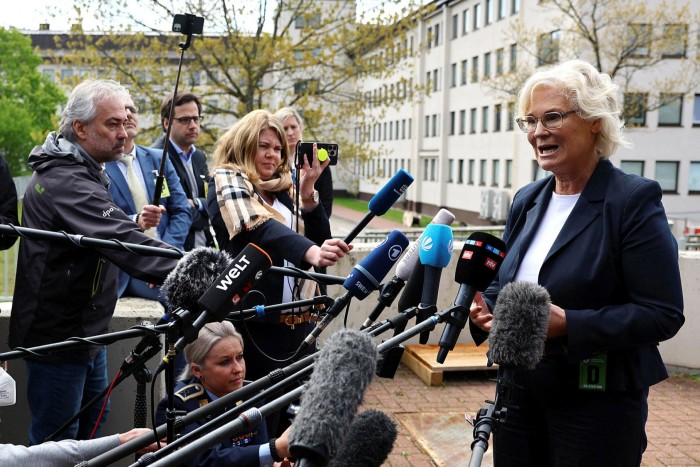Germany has agreed to allow the export of heavy weaponry to Ukraine for the first time, in a volte-face that followed weeks of mounting pressure on Olaf Scholz’s government to do more to help Kyiv.
Christine Lambrecht, defence minister, announced on Tuesday that Berlin would allow the export of anti-aircraft cannon tanks known as the Gepard — meaning Cheetah — to help Kyiv defend itself against Russia’s invasion. “We are determined to combine our efforts to help the Ukrainian people in this existential emergency,” Lambrecht said.
She unveiled the decision at US-hosted defence talks being held at the Ramstein air base in western Germany, which were organised to shore up support for Ukraine and co-ordinate the delivery of arms. Representatives from more than 40 nations are attending the talks.
Lloyd Austin, US defence secretary, said western countries would “keep moving heaven and earth” to supply Ukraine with weapons to defend itself.
Scholz, Germany’s chancellor, has for weeks resisted calls for the country to deliver heavy weapons such as tanks and armoured personnel carriers to Ukraine, saying such a move might trigger a direct military confrontation between Nato and Russia that could lead to a nuclear war.
But he has faced growing pressure to change course in recent days as Russia mounts a major new offensive in Ukraine’s eastern border region of Donbas.

Ukraine has pleaded for the west to provide more long-range weapons. General Mark Milley, chairman of the US joint chiefs of staff, said in Ramstein that the coming weeks were “critical”. “Time is not on Ukraine’s side,” he said. “The outcome of this battle, right here, today, is dependent on the people in this room.”
Germany’s position on supplying arms to Ukraine has progressively changed since the start of Russia’s invasion on February 24. Initially, it adhered to Berlin’s longstanding policy of not exporting weapons to conflict zones. But it changed course within days, agreeing to supply Ukraine with anti-tank and anti-aircraft weapons.
Earlier this month, Scholz said Germany would also compensate eastern European countries that sent Soviet-made arms to Ukraine with western kit from its own stock.
One of the main obstacles preventing Germany from sending military gear to Ukraine was the parlous state of the Bundeswehr, which has been squeezed by years of spending cuts and has barely any spare equipment. Shortly after Russia’s invasion of Ukraine, Scholz announced a €100bn fund to modernise Germany’s armed forces.
The 50 or so Gepards that will be supplied to Kyiv were decommissioned from the Bundeswehr several years ago and returned to their manufacturer, Krauss-Maffei Wegmann. The company plans to refurbish the weapons and send them directly to Ukraine.
The system was developed in the 1960s and first deployed in the 1970s. It was the cornerstone of the Bundeswehr’s air defences until it was phased out in 2010. The vehicle, which has its own radar system, can be used to hit both aerial and ground targets.
Lambrecht said Germany was also training Ukrainian soldiers to use western artillery systems such as the PzH 2000 tank howitzer sent to Ukraine by the Netherlands.
In addition, Berlin was operating a scheme known as “Ukraine orders and Germany pays”, under which Kyiv requested weapons from a list provided by German arms manufacturers and Berlin supplied the funds, she said.

